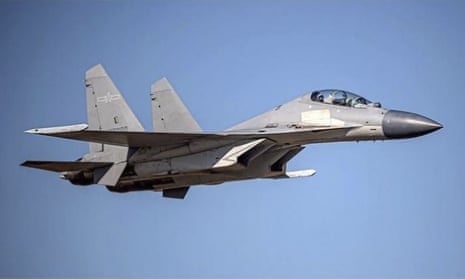The Australian government has raised concerns about China’s increased incursions into Taiwan’s air defence zone and warned against “the threat or use of force”.
Taiwan has said Beijing sent nearly 150 fighter jets and bombers into its air defence zone over four consecutive days, prompting the US to describe the incursions as “provocative” and “destabilising”. Taiwan’s foreign minister, Joseph Wu, described the activity as “threatening”.
The People’s Liberation Army (PLA) Air Force sent a record 56 planes into Taiwan’s air defence zone on Monday. It followed 16 on Sunday, a previous record of 39 on Saturday, and 38 on Friday.
The Australian government weighed in on Monday evening, declaring that Canberra wanted “an Indo-Pacific region that is secure, prosperous and based on the rule of law”.
“Australia is concerned by China’s increased air incursions into Taiwan’s air defence zone over the past week,” a spokesperson for the Department of Foreign Affairs and Trade said in response to questions from Guardian Australia.
“Resolution of differences over Taiwan and other regional issues must be achieved peacefully through dialogue and without the threat or use of force or coercion.”
The spokesperson did not comment on a renewed call from Wu for security and intelligence exchanges between Taiwan and Australia.
But Australia and the US last month flagged plans “to strengthen ties with Taiwan”, which they described as “a leading democracy and a critical partner for both countries”.
After the Ausmin talks in Washington DC, Australian ministers Marise Payne and Peter Dutton and their US counterparts, Antony Blinken and Lloyd Austin, also pledged support for Taiwan’s “meaningful participation in international organisations”.
The Chinese Communist party (CCP) considers Taiwan to be a province of China, despite the party never having ruled the island, and has vowed to take it by force if necessary.
China’s president, Xi Jinping, has described Taiwan becoming part of the mainland as “inevitable”.
The Global Times, a hawkish state-backed tabloid which publishes in English, on Sunday described the weekend sorties as a demonstration of “the strong ability” of the People’s Liberation Army “to form a wartime air attack”.
“The increase in the number of aircraft showed the PLA air force’s operational capabilities,” it said in an editorial.
“The PLA is forming a siege of Taiwan with a show of strength as it did in Beijing in 1949. There is no doubt about the future of the situation across the Taiwan Straits. The initiative of when and how to solve the Taiwan question is firmly in the hands of the Chinese mainland.”
US military officials have begun to talk openly about their concerns that China could consider a military invasion.
While there is broad consensus that China will make a move on Taiwan, the timing and nature of such action is strongly debated among analysts and government figures.
Some analysts have argued China is more likely to embark on “step-by-step coercion of Taiwan” to destabilise Taiwanese society and force it to accept unification talks.
Linda Jakobson, the founding director of the Australia-based China Matters thinktank, has said Australia should plan for such a scenario, entering discussions with allies on how to jointly push back if Beijing intensifies pressure on the democratically ruled Taiwan.
In an interview with the ABC, aired on Monday, Wu welcomed the new Aukus security partnership that will see the US and the UK help Australia to acquire nuclear-powered submarines.
Wu said Taiwan was “pleased” to see like-minded partners “working closer with each other to acquire more advanced defence articles so that we can defend Indo-Pacific”.
“Australia is a great country, and I’m very glad to see that Australia is going to shoulder more responsibility to maintain peace and stability in the Indo-Pacific,” he told the ABC.
Wu also renewed his previous comments that Taiwan would appreciate international intelligence and security assistance from partners including Australia. He has not specifically requested military involvement.
The latest developments come amid growing tensions between Australia and China, its largest trading partner.
China and Taiwan have also submitted duelling bids to enter the regional trade pact known as the Comprehensive and Progressive Agreement for the Trans-Pacific Partnership.
Last week, former Australian prime minister Tony Abbott said the government should not allow a fear of further inflaming tensions with Beijing get in the way of accepting Taiwan’s bid to join the trade grouping.
